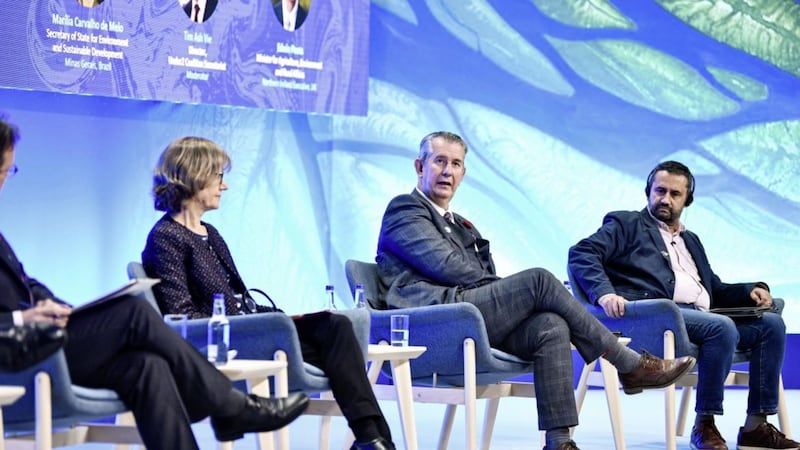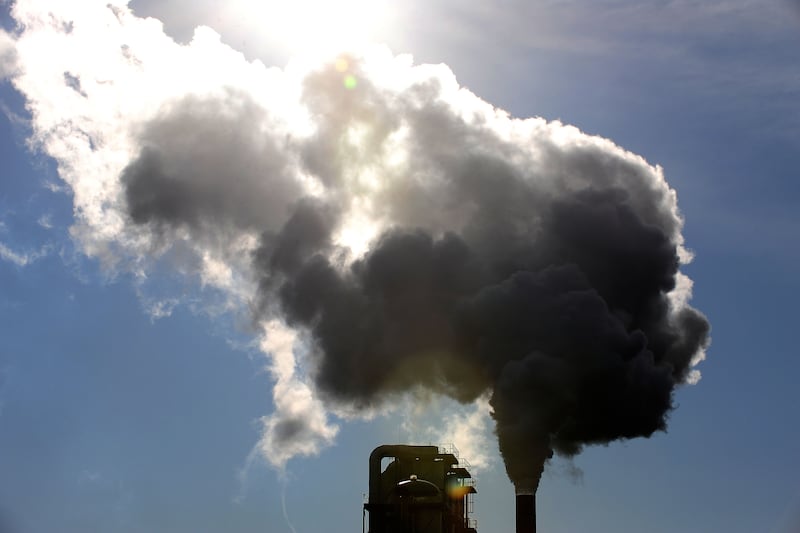Cop26 has really attracted the big names - Barack Obama, Leonardo Di Caprio, Greta Thunberg, various British royals and… er… Edwin Poots.
The DUP minister launched a new draft environmental strategy for Northern Ireland last week, just as UN secretary-general Antonio Guterres warned that the goal of limiting global warming to 1.5C - as pledged at the 2015 Paris climate summit - is on "life support”.
Launching the strategy at the Cop26 summit in Glasgow, Mr Poots had the air of someone who had forgotten their GCSE history homework and quickly had to cobble together that essay on the Weimar Republic at lunchtime.
He correctly said that “urgent action is required if we are to realistically respond to the challenges of climate change, the destruction of habitats, the loss of biodiversity and the impacts of pollution on land and at sea”.
Not that you’d know it from the actual document.
Blander than a Michael Bublé Christmas album and about as clear as a foggy car window on a winter morning, the strategy read as a series of inconsequential statements and vague aspirations rather than an action plan.
Covering everything from clean air to environmental education, the 78-page strategy, which is out for consultation until January, touches on so many areas it’s hard to see what it can actually achieve.
There is apparently “broad acceptance of the desirability of shifting towards a low-carbon economy”, in much the same way as everyone, bar the odd crank, accepts the reality of global warming.
Some of the aspirations are laudable - it’s hard to argue with the aim of championing a group of '30 under 30’ environmental leaders by 2023 or the introduction of a deposit return scheme for drinks containers.
But many of the ‘future visions’ were hilariously banal.
“Northern Ireland will be Nature Positive by 2030 and living in harmony with nature by 2050,” the strategy read.
By that logic, we are at war with nature and will be for the next 30 years.
One of document’s ‘outcomes’ aims to see the regular use of reusable bags. The plastic bag levy, which was established to do exactly the same thing, was introduced eight years ago.
Maybe it's time to be a bit more ambitious.
Light on clear plans and heavy on waffle, the few targets in the strategy seem to have been plucked from thin air.
The document suggested that woodland cover in the north should be increased to 8.8 per cent (around 122,000 hectares) by 2030. But according to the Woodland Trust Northern Ireland needs to aim for woodland levels of 16 per cent to 18 per cent.
No wonder that the RSPB NI, while welcoming the strategy, pointed out that the executive had a poor track record in taking real action against climate change.
"It’s time words are met with action, as Northern Ireland is one of the most nature depleted countries in the world," the charity said.
The strategy did highlight serious issues but, in most cases, gave little indication of how they would be addressed.
Around 96 per cent of ammonia emissions in the north come from agriculture - mainly via the spreading of slurry and fertiliser.
These emissions have a huge impact on the soil, rivers and lakes, damaging important ecosystems.
Yet from 2010 to 2017 agricultural ammonia emissions increased by 20 per cent - roughly equivalent to the peak emissions of the late 1990s.
Increasing numbers of livestock; greater use of indoor housing systems for animals and “insufficient uptake of ammonia reduction measures” are behind the rise in emissions, the strategy read.
But rather than address the issue and highlight how emissions could be cut, the document instead referred to “the forthcoming Ammonia Strategy”.
A report by Queen’s University, released on the same day as the environmental strategy, pointed out that Northern Ireland is lagging behind Britain in reducing our carbon emissions.
Between 2005 and 2019, the north reduced its carbon emissions by 23 per cent, compared to 56 per cent in the north-east of England.
The average reduction across the UK was 36 per cent.
That report clearly stated that by properly insulating all homes in Northern Ireland we could save £200,000,000 by 2030.
So as the cost of heating our homes continues to soar why doesn't the executive focus on improving their energy efficiency?
Let's not dilute our response to the climate crisis by aiming for vague targets.








